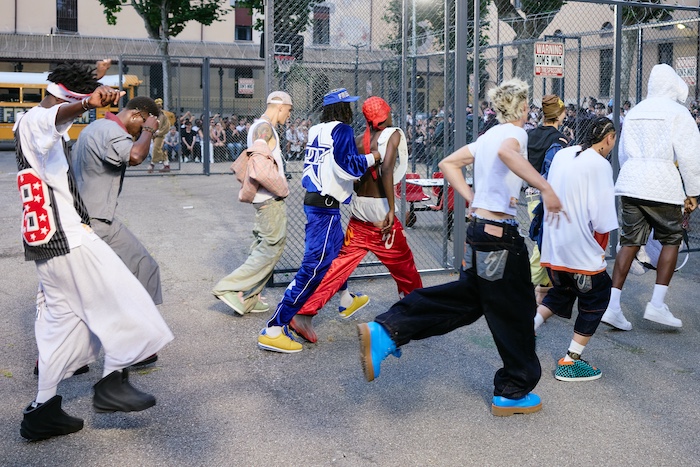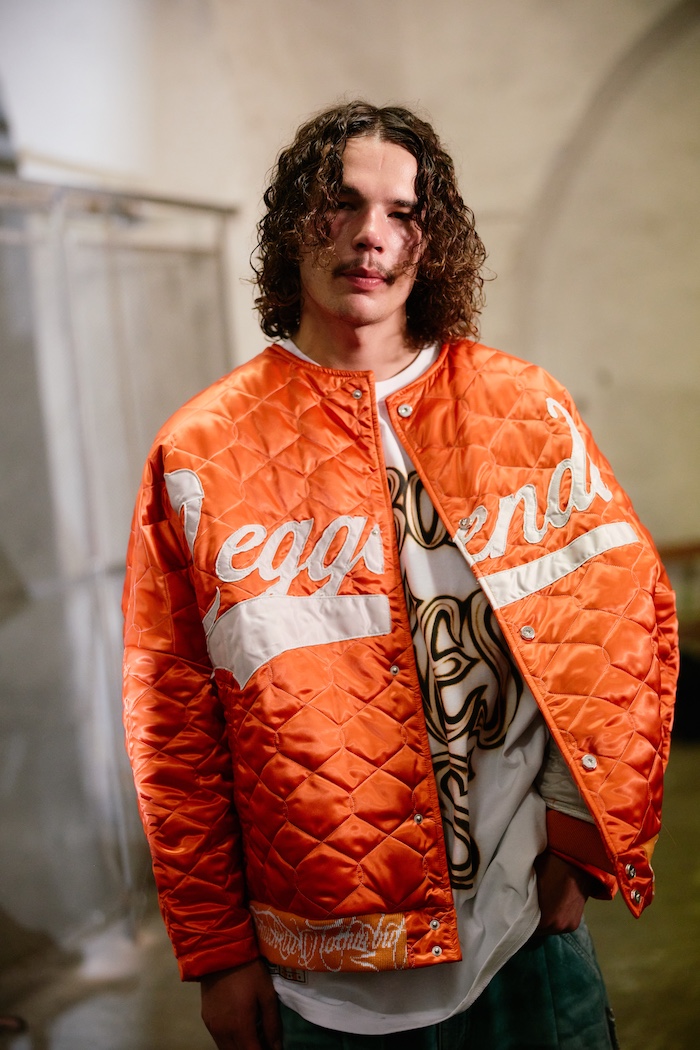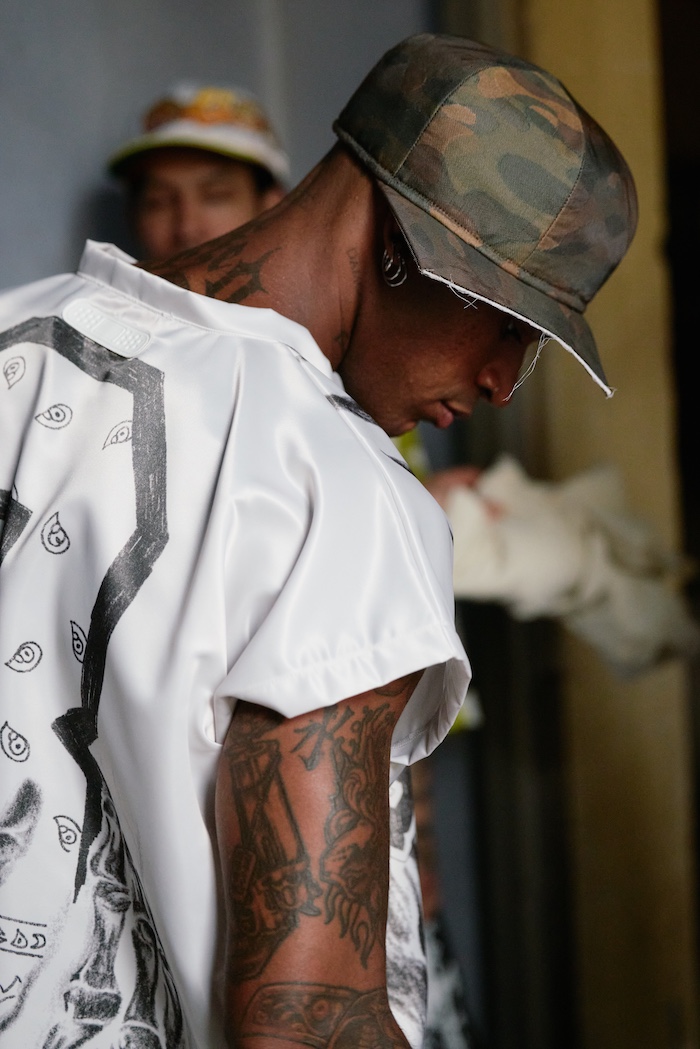 |
| Backstage before Domenico Formichetti's SS26 show at Milan Fashion Week. Photograph (above) by Jay Zoo for DAM |
On a hot summer night in Milan, Domenico Formichetti lit a fuse under the status quo. While some designers opt for classical style, polish and predictability, the Italian creative director and founder of Italian label PDF, dug into the raw and the real, turning his Spring/Summer 2026 collection into a visceral act of self-disclosure, an unraveling of psychological tension rendered in seams, silhouettes, and sound, writes Jeanne-Marie Cilento. Photography by Jay Zoo
 |
The escape of prisoners in the performance piece, before the show, represented the designer's breakout from the mental shackles holding him back. |
With a giant chain-link fenced cage at its core and a cast
of restless avatars of emotion, the runway became a battleground between inner
chaos and outer composure. What unfolded wasn’t just a collection, it was a
confession, a confrontation, and ultimately, a creative exorcism. Through
garments that moved from constriction to release, the Italian designer posed a
powerful question: What happens when we stop
performing and start telling the truth?
Inside the cage, the show’s opening moments presented not
models, but figures wearing striped uniforms pacing, lifting weights, dropping and doing push-ups. These were all symbols of Formichetti’s internal
dialogue. “I wanted to make my mind visible,” he explained after the show. “Sometimes my mind feels like a cage. Like all these emotions and possibilities are trapped in there, and
the only way out is to create.”
It’s a sentiment that resonated throughout the 42-look collection, which tracked a journey from restriction to liberation. Gone was the chaotic spectacle of PDF’s first off-calendar show. In its place: a more refined, narratively driven presentation that still held onto the brand’s raw emotional core. This was Formichetti at his most introspective and yet, paradoxically, his most accessible.
“Sometimes my mind feels like a cage, the only way out is to create.”
 |
Domenico Formichetti (at right) joins the joyful running in leaps at the finale. |
“There’s always a tension I’m exploring,” Formichetti said. “Between what people expect of me and what I actually want to say.
Between the business, the noise, the image, and the truth.”
It was evident in the elevated treatment of PDF’s signature
elements. The denim was more intricate and layered with sheer mesh
or accented with exposed seams. Outerwear played with exaggerated volumes and
utility detailing, nodding to workwear and street uniforms while subverting
both. And in a move that signals the brand’s growing commercial confidence,
there was a notable focus on footwear: vivid, velvety loafers, striped slides and brilliantly-hued sneakers that felt
pulled from a childhood memory of rebellion.
“There’s always friction, between what
people expect of me and what I actually want to say”
 |
Formichetti's new collection showed a strong sense of expressiveness. |
Where many fashion shows stage fantasy, Freed-dom felt intensely real. The set, a concrete yard hemmed in by steel fencing, was less set dressing than psychological architecture.
The soundtrack underscored the show’s
emotional gravity, with distorted voiceovers repeating lines like, “Mind can
be a prison, trapping emotions and locking away ideas… Don’t die in silence.
Set your mind free.”
The choreography reflected this tension. Models didn’t just
walk, they ran, jumped and leapt. Each movement
suggested struggle or emergence, often both. It was performance art disguised
as a runway show, with the fashion acting as both costume and revelation.
And yet, the show never tipped into self-indulgence. Even as it mined Formichetti’s inner world, it spoke to a broader, more universal experience: the difficulty of expression in an age of constant surveillance and curated identity. It wasn’t about escape, it was about confrontation.
As with past shows, Formichetti’s casting was personal. He tapped artists, athletes, and collaborators from PDF’s growing
orbit - names like Rafael Leão, Stefon Diggs, Alvin Kamara, Tony Effe, and Julez
Smith. These weren’t traditional models, but represented PDF’s ethos: authenticity
over artifice, emotion over polish.
What unfolded wasn’t just a collection, it was a confession, a confrontation, and ultimately, a creative exorcism
 |
Italian rapper Tony Effe walked the runway for the designer. |
The casting strategy aligns with PDF’s grassroots rise. Since its 2023 launch, the label has been powered by organic momentum with the likes of Drake and Central Cee helping to boost the labels profile, but the real strength lies in Formichetti’s commitment to accessibility. PDF may show in Milan, but its soul remains tethered to the streets of Chieti and the manufacturers in his native Abruzzo, where the garments are still produced.
Ultimately, the new collection marked a shift in scale for
PDF, not just commercially, but conceptually. The collection is sharper, the
messaging more focused, the vision more clearly articulated. But it’s also
riskier. It invites the audience to not just admire, but to feel, and that’s a
vulnerable ask in fashion’s notoriously detached arena.
“This is the beginning of something,” Formichetti explained. “Because once you break out, you don’t go back.”
With Free-dom, the designer didn’t just break out but broke open. What began as an expression of one man’s internal struggle became a communal declaration, an insistence that style is not just surface, but substance. In that prison yard in Milan, Formichetti didn’t just show a collection. He let something go. And in doing so, he asked everyone watching: what are you still keeping locked inside?
Scroll down to see highlights from the PDF by Domenico Formichetti collection plus exclusive backstage moments.






































































